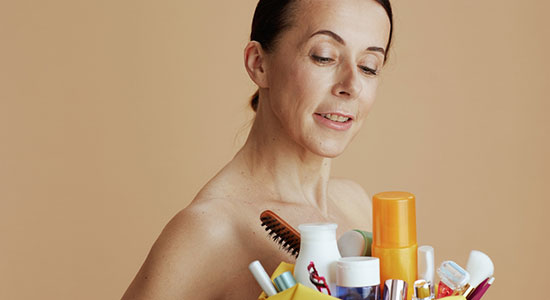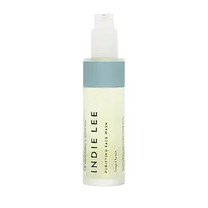Article page ad banners
1:1 Square 4:5 Vertical 3:2 Rectangle 4:3 Rectangle 16:9 Panoramic 1.59:1 Landscape Ratio ...

Last Updated on,
April 5th, 2024

Finding the right skincare solutions can be challenging, especially when you have aging and sensitive skin. But you’re not alone in this journey. Many people with aging skin also have sensitive skin, making it crucial to tackle both issues together.
As you age, your skin undergoes various transformations, becoming more delicate and susceptible to irritants. This has led to a growing demand for specialized skincare products that cater to these unique needs.
The skincare landscape has evolved to accommodate this demand. There has been a surge in targeted products formulated to help aging and sensitive skin.
This guide aims to be your unparalleled resource in response to this evolving landscape. It will empower you to navigate the maze of options and discover products that will truly nurture and rejuvenate your skin.
Aging skin undergoes various changes due to decreased collagen production, reduced oil secretion, and environmental exposure. These changes cause wrinkles, fine lines, dryness, and thinner skin.
As skin ages, the weakened skin barrier can also increase sensitivities. Therefore, to prevent further damage, skincare for aging, sensitive skin should focus on the following:
The point where aging and sensitive skin intersect is a critical juncture. Here, the challenges of both aging and sensitivity come together, creating a unique set of demands for skin care.
Sensitive skin is prone to dryness, redness, itching, and reactions to various irritants. As your skin ages, its natural protective barrier weakens, making it more susceptible to irritations.
Common skin irritants include:
Sensitive skin challenges with aging also include slower cell turnover, which affects the skin’s natural healing process.
In the realm of skincare products lies active ingredients that each play a specific role. These ingredients are the powerhouse behind the efficacy of skin care products, working tirelessly to address various skin concerns and deliver the promised benefits.
Understanding their functions is key to making informed choices about the products you incorporate into your skincare regimen. Anti-aging sensitive skin ingredients you should look for include:
Retinol is a derivative of vitamin A and is well-known for its anti-aging properties.1 It helps to increase cell turnover, stimulate collagen production, and improve the appearance of fine lines and wrinkles. Although effective, it’s important to introduce it gradually to avoid potential irritation, especially for sensitive skin.
Hyaluronic acid is a powerful ingredient that attracts and retains moisture in the skin.2 It hydrates and plumps the skin, reducing the appearance of fine lines and promoting a smoother complexion. It’s particularly beneficial for sensitive skin, providing hydration without causing irritation.
Peptides are short chains of amino acids that support collagen production and improve skin elasticity. They aid in minimizing the appearance of wrinkles and promoting firmer skin.3 Peptides are generally well-tolerated and can be suitable for sensitive skin types.
Zinc oxide provides broad-spectrum protection against UVA and UVB sun rays. While it’s primarily known for its sun protection benefits, it also has a soothing effect on the skin and helps to reduce inflammation. While zinc oxide doesn’t directly prevent aging, it plays a crucial role in protecting the skin from further damage caused by UV exposure,4 which significantly contributes to premature aging.
Incorporating these active ingredients into a skincare routine can help you address aging concerns, especially if your skin is sensitive.
The formulation of skincare products significantly affects their effectiveness and safety. A well-formulated product considers the interactions between ingredients, their concentrations, and their delivery mechanisms.
When choosing aging skincare products for sensitive skin, prioritize those with a minimal ingredient list and a balanced blend of active ingredients.
Opt for products labeled as “gentle,” “hypoallergenic,” and “fragrance-free.” Avoid harsh chemicals and potential irritants.
Gradually introduce new products to avoid overwhelming your skin. As always, do a patch test first to help gauge your skin’s reaction.
Choosing the right cleanser for aging skin is essential to maintain health and appearance.
Consider the following factors when selecting an aging skin cleanser for sensitive skin:
Check for user reviews to gauge how the cleanser has worked for others with similar skin concerns, especially for senior skincare. Positive reviews from those with aging and sensitive skin can indicate how well it could work for you.
We’ve curated a few highly recommended aging skin cleansers for you:

Pros: Contains ceramides and hyaluronic acid for hydration. It is fragrance-free and suitable for sensitive skin.
Cons: May not effectively remove heavy makeup.
Price: $12 for 12 oz

Pros: Extremely gentle, suitable for sensitive and dry skin. Maintains the skin's natural moisture barrier.
Cons: Some users may find it slightly expensive.
Price: Usually around $15 for 13.5 oz

Pros: Contains natural ingredients like orange and lavender extract. Vegan and cruelty-free.
Cons: Gel texture may not be ideal for all users.
Price: Typically around $38 for 4.2 oz

Pros: Gentle, non-foaming cleanser that restores radiance for sensitive skin types. pH-balanced and fragrance-free.
Cons: You may need to use more products to remove heavy makeup.
Price: Usually around $54 for 5 oz
Remember, individual skin reactions can vary, so it’s a good idea to do a patch test before using a new product on your face. Additionally, the prices mentioned are approximate and may vary based on location and availability.
Moisturizers are essential if you’re dealing with sensitive skin and anti-aging concerns. With age, your skin can lose moisture, leading to dryness, fine lines, and sensitivity to irritation.
Specially formulated moisturizers step in by replenishing hydration and creating a protective barrier. This barrier shields your sensitive skin and helps reduce wrinkles and age-related issues. For senior skincare, a suitable moisturizer is vital in maintaining vibrant and healthy skin.
Anti-aging sensitive skin moisturizer should:
Some say moisturizers are the foundation of youth. A variety of moisturizers available on the market are specifically designed to cater to the needs of sensitive and aging skin.
We’ve put together a list of dermatologist-recommended skincare for aging, sensitive skin. These anti-aging sensitive skin moisturizers include:

Pros: Lightweight, non-greasy formula suitable for sensitive skin. Hyaluronic acid helps retain moisture.
Cons: It may not provide sufficient hydration for extremely dry skin.
Price: Typically around $14 for 3 oz

Pros: Contains omega fatty acids to strengthen the skin barrier. Nourishing and suitable for sensitive skin.
Cons: Some users may find the texture too thick.
Price: Typically around $35 for 1.7 oz

Pros: Restores essential skin lipids like ceramides, natural cholesterol, and fatty acids. Improves the look of skin texture and evenness.
Cons: Some users may find it a bit pricey.
Price: Usually around $150 for 1.6 oz
Sunscreens help prevent skin aging and irritation. They shield against UV rays5, which trigger premature aging by damaging collagen and elastin.
For sensitive skin, sunscreens also prevent redness and discomfort caused by UV exposure.
In senior skincare, including zinc oxide is particularly noteworthy due to its ability to prevent aging.4 Zinc oxide helps maintain the skin’s youthful vitality by forming a protective barrier. This makes it a valuable asset in the arsenal of senior skincare, offering protection and a proactive approach to combating the signs of aging.
With so many sunscreen options on the shelf, which should you use if you have aging, sensitive skin?

Pros: Gentle formula for sensitive skin. Provides high SPF protection.
Cons: May leave a slight shine on the skin.
Price: Usually around $10 for 1.4 oz.
When selecting a sunscreen, prioritize broad-spectrum protection (UVA and UVB), and choose one with an SPF of at least 30.6 Keep in mind that sunscreen needs to be reapplied every two hours, or more often if you’re sweating or swimming, for adequate protection.
DIY skincare solutions provide a natural and cost-effective way to address multiple skin concerns.
Some simple DIY aging skincare solutions and natural remedies for sensitive aging skin:
Mix equal parts of honey and plain yogurt. Apply the mixture to your face and leave it on for about 15-20 minutes. Honey is soothing and moisturizing, while yogurt contains lactic acid that can gently exfoliate and hydrate the skin.
Blend oats to create a fine powder and mix with milk to form a paste. Gently massage this mixture onto your face and rinse off with lukewarm water. Oats have anti-inflammatory properties and can help cleanse and soothe sensitive skin.
Mix equal parts of rosewater and aloe vera gel. Apply this mixture as a moisturizer after cleansing. Rosewater has soothing properties, while aloe vera provides hydration and can reduce redness.
Mash a ripe avocado and a ripe banana together to create a creamy paste. Apply this mask to your face and leave it on for about 15 minutes. Avocados and bananas are rich in vitamins and antioxidants that can nourish and hydrate the skin.
While these DIY solutions can be gentle and beneficial, individual reactions can vary. These remedies don’t replace a well-formulated skincare routine, especially for aging skin.
Dr. Patrick Keehan, D.O., states, “Cleansing your face twice a day with a mild cleanser (not a soap) will keep your pores cleaner and help wash away dirt and impurities.”
He also mentions, “… a daily sunscreen or sunblock will not only help prevent cancer, but they can also reduce the number of wrinkles we get as we age.”According to a study including over 150 dermatologists from the U.S., most dermatologists agree that sunscreen helps lower the risk of skin cancer and reduces photoaging caused by the sun. They recommend their family and friends use sunscreen.7
Outside of proper cleansing and shielding of the skin from the sun, experts like Ryan Leach, a board-certified Physician Assistant at The Dermatology Specialists, recommend “…patients stop smoking, avoid being exposed to secondhand smoke, and eliminate tanning beds from their routine.” Certain lifestyle habits negatively impact your health and skin, which, in this case, advances the aging process.
When caring for aging and sensitive skin, knowing what to avoid is just as important as knowing what to do. Here’s how to avoid common mistakes:
By sidestepping skincare mistakes and opting for a gentle, consistent routine, you can effectively nurture and maintain the health of your aging and sensitive skin. Everyone’s skin is unique, so finding what works best for you might involve trial and error.
This essential skincare guide acts as an anti-aging roadmap, mainly addressing sensitive skin concerns for people over 55. The challenges of sensitive skin and the effects of time create a delicate balance that requires tailored care.
Understanding the vital role of active ingredients, the significance of formulation, and the importance of cleansers and moisturizers unlocks the potential for rejuvenation.
Incorporating sunscreen as a reliable defense against aging and irritation and acknowledging the potential of DIY solutions provides a comprehensive set of tools for effective senior skincare.
To achieve timeless skin, you must pay consistent attention to cleansing, protection, and lifestyle decisions. Maintain self-care that includes a balanced diet, hydration, and sleep, and supports the fight against aging and sensitive skin.



Unlock expert insights and tips with our exclusive ebook. Enter your email to get your free copy.
Please check your email for a welcome message from Modern60. If it's not in your inbox, kindly check your spam or junk folder
There are no comments yet